- Article
- Read in 10 minutes
Steve Hackett – With Orchestra: Genesis Revisited (Royal Festival Hall London 2018) – report
In 2018, Steve Hackett played a short but intense UK tour with band and orchestra – Genesis Revisited live. Thomas Jesse attended one of the shows in London and shared his thoughts.
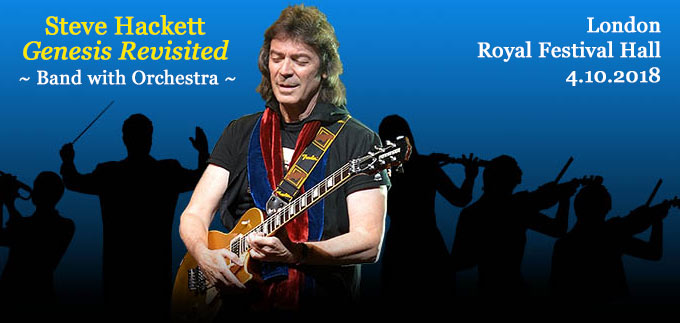
1. Private matters
In 1999 the wife and I (well, actually we were not married yet at the time; neither did we have children then) travelled to London to celebrate the 10th anniversary of the band Iona at the Royal Festival Hall. Iona played a breathtaking show with the All Souls Orchestra and guests from the band’s past (on 09/25/1999) which was released on CD as The Woven Chord [*1]. Unfortunately, video footage would never be released for legal reasons. Coming back to this venue after nearly twenty years full of love, wonderful experiences and lots of music, meant coming full circle in a way…
2. Ausgang
Besides Iona, I have seen Yes and, of course, Peter Gabriel perform with an orchestra (on 09/11/2001 and 03/25/2010 as well as 05/09/2019, respectively). Steve Hackett would extend this list. Of course, Steve has worked with an orchestra before. He recorded his delicious A Midsummer Night’s Dream with the Royal Philharmonic Orchestra and a second album about the myth of Orpheus and Eurydice was created with the Underworld Orchestra (Metamorpheus). A few years ago he played at the Handel Festspiele in Halle/Saale, Germany (06/10/2012, *2), with Todmobile and Orchestra in Iceland(06/16 and 17/2015, *3) and another concert with an orchestra in Buffalo, USA (03/03/2017, *4).
Steve also stayed in contact with Bradley Thachuk [*5] who conducted the orchestra there, developed orchestral arrangement of his music and then proceeded to set up this brief tour with band and orchestra.
3. Location
The Royal Festival Hall is located near Waterloo Station and Waterloo Bridge. It was completed in 1951 [*6] and has since become part of the Southbank Centre. Truth be told, seen from the outside it is an ugly lump of concrete, its architectural concepts very firmly dated in the 1950s. The Royal Philharmonic Orchestra resides here. Many artists from classical music, rock and pop have played at this 2,900-seater. Since the late 1980s the Festival Hall has adopted an open foyers concept, which means that larger parts of the foyers are open to the public even when there are no performances. This offer was widely taken up by the public. In fact, the foyers of the Festival Hall are now among the most frequently used places in London. We went there in the morning to look around before we walked down the Thames and explored the Docklands with their skyscrapers (what a building frenzy!). In the evening, we took our seats on the balcony, level 6 (rather far up), to the left of the stage.
3. Concept, stage, arrangement of musicians
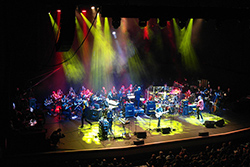 The Heart Of England Philharmonic Orchestra that accompanied Steve and his band had opted for what is known as the classical arrangement [*7], i.e. the first violins on the very left and the second violins on the very right. Violas, celli and bass sat in the middle, in this case with the basses to the right of the stage near the drum kit. The wind instruments sat behind the strings. They are usually arranged in a way that the instruments that play the highest notes sit to the left of the conductor (and the audience), so the normal order is flutes – clarinets – oboes – bassoons. The order was the same, but the wind instruments sat to the right of the strings. The brass winds would usually sit behind the wood winds – for the obvious reasons that their instruments are so loud that it is best to have them as far away from the audience as possible. That night the brass winds were placed next to Gary O’Toole’s drums and behind the basses. The orchestra percussion was located slightly to the right behind Gary O’Toole. The rock band were arranged in what has become Steve’s favourite positioning in the front of the stage, with Roger’s keyboard close to the strings and Gary’s drumkit centre right near woodwinds and brasswinds. The conductor stood on a small pedestal between the keyboards and the drums.
The Heart Of England Philharmonic Orchestra that accompanied Steve and his band had opted for what is known as the classical arrangement [*7], i.e. the first violins on the very left and the second violins on the very right. Violas, celli and bass sat in the middle, in this case with the basses to the right of the stage near the drum kit. The wind instruments sat behind the strings. They are usually arranged in a way that the instruments that play the highest notes sit to the left of the conductor (and the audience), so the normal order is flutes – clarinets – oboes – bassoons. The order was the same, but the wind instruments sat to the right of the strings. The brass winds would usually sit behind the wood winds – for the obvious reasons that their instruments are so loud that it is best to have them as far away from the audience as possible. That night the brass winds were placed next to Gary O’Toole’s drums and behind the basses. The orchestra percussion was located slightly to the right behind Gary O’Toole. The rock band were arranged in what has become Steve’s favourite positioning in the front of the stage, with Roger’s keyboard close to the strings and Gary’s drumkit centre right near woodwinds and brasswinds. The conductor stood on a small pedestal between the keyboards and the drums.
In a nutshell: From left to right, strings, woodwinds, drums, brass, with the basses in front of them.
4. Conzert
Steve’s concert at the Royal Festival Hall was the second of eight dates on the Genesis Revisited Band & Orchestra tour. The musicians were already attuned to each other and the live conditions. The set list followed the set from the Buffalo show in 2017 [*8]:
Dance on a Volcano
Out of the Body
The Steppes
Firth of Fifth
Dancing With the Moonlit Knight
Blood on the Rooftops
Shadow of the Hierophant
break
…In That Quiet Earth
Afterglow
Serpentine Song
El Niño
Supper’s Ready
encore
The Musical Box
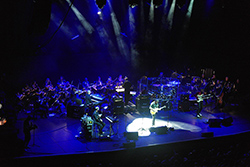 Steve played many Genesis classics as well as five of his solo songs.
Steve played many Genesis classics as well as five of his solo songs.
When the orchestra had taken their places, the band and the conductor entered to frenetic applause. The stage lit in red (the light show was the same as on the American tour earlier in 2018), and the ticking guitar sounds of Dance On A Volcano rang out. The strings came in, and Ned fought to sing against this wall of sound. It was a losing battle in the beginning. I had the impression that he missed his cues, or was a bit late, or perhaps simply too far away from the microphone (nervous?). The peculiar sound became even more peculiar as the string added an indescribable flavour to the sound with the brass instruments, who actually found it very difficult to counter the keyboards. All this furious dance was held together by Steve’s guitar, which was very prominent in the mix, and a very Bradly Thachuk conducting. Opening with this lightfooted but very tricky song was a brave decision. It worked better from note to note, from bar to bar. The dance ended soon, the audience were breathless before the erupted into applause.
Steve thanked everybody and joked about people apparently knowing the song. He announced that he would play a couple of other songs like that, adding that the song to follow was from Wolflight and felt as if it was tailor-made for an orchestra. Out Of The Body as the second piece was a risky decision, but it worked! Three sets of drums and percussion played, the strings came in and Steve’s solo was simply brilliant. Out Of The Body segued seamlessly into one of my favourite Hackett tracks, The Steppes from Defector. It was incredible to hear how the band and the orchestra ascended step by step ever more jubilantly and brilliantly, creating a wall of sound that shook the whole venue. Never before have I experienced a song as intensely. It was not the last time I almost forgot to breathe.
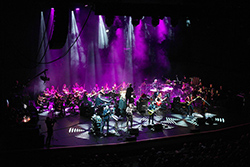 The set calmed down a bit. Steve announced a song from Selling England By The Pound. Lo and behold, Firth of Fifth was played before Dancing With The Moonlit Knight. The song with Steve Hackett’s guitar solo … how unearthly beautiful it was! The solo was framed by gentle string sounds and did not seem to end. Steve looked dreamily away toward the stage ceiling, and everybody else seemed just as taken with the music. Tears came to my eyes. This is how Genesis can sound with an orchestra, this is how you bring together pop music and “serious” music!
The set calmed down a bit. Steve announced a song from Selling England By The Pound. Lo and behold, Firth of Fifth was played before Dancing With The Moonlit Knight. The song with Steve Hackett’s guitar solo … how unearthly beautiful it was! The solo was framed by gentle string sounds and did not seem to end. Steve looked dreamily away toward the stage ceiling, and everybody else seemed just as taken with the music. Tears came to my eyes. This is how Genesis can sound with an orchestra, this is how you bring together pop music and “serious” music!
Nad returned to the stage to briefly sing the Moonlit Knight. Strings and guitar came in and created an unusual sound that never changed the structure of the music, but took it to breathtaking heights. Genesis played live with two drummers after Peter Gabriel had left, well, here there were three and they worked together splendidly. Steve switched to acoustic guitar and played Blood On The Rooftops. The keyboard lines were played mainly by the strings and the woodwinds, with Roger modestly in the background. It did not sound corny in the least – the melancholy of the song was stressed and really brought out by the classic-acoustic instruments. Now it was time to take a deep breath, dream and breathe out with a deep sigh, for words fail me to describe what came next. Steve mentioned special guests to join him on stage and compared them to Christmas surprise presents. He then asked his sister-in-law Amanda Lehmann to join him on stage. Her vocals were crucial for the wonderful long Shadow Of The Hierophant. It is hard to describe the splendor of the band and the orchestra – it all came together. I love Richard Strauss’ Thus Spake Zarathustra, the cacophony of sounds, melodies and rhythms that develop into a grand finale. Here, in the swirling pleasure of Hackett’s masterpiece I found the poetry of Richard Strauss. I was so moved that the wife had to hold my hand; I hardly noticed that the interval began at the end of this piece.
The second half of the evening began with …In That Quiet Earth and Afterglow. It was performed brilliantly, it was sung very well, but after the finale furioso of the first half I could not muster the strength to fully appreciate the ending of Wind & Wuthering. I wonder, though, what Tony Banks would have to say about the orchestral interpretation of his Afterglow? I, for one, enjoyed the way the orchestra replaced keyboard parts and really added to what the band (do they need any higher praise?) achieved.
Amanda Lehmann and Steve’s brother John returned to the stage. Steve dedicated the song that followed to their father (who certainly watched the show from the heavens), and proceeded to play a Serpentine Song full of violins in which John’s flute rather drowned. El Niñowith its Eastern sounds kept up the fine momentum of the musical river before the upcoming climax of the show, Genesis’s masterpiece, the magnum opus that has been begging for an orchestral performance, Supper’s Ready.
„If someone asked me whether I had listened then I could not really know. It was not listening, it was being in the music; I was far too absorbed to listen to what I heard.“[*9].
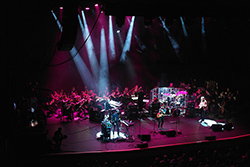 These words by the Romantic poet Bettina von Arnim [*10], express nicely what I felt in those twentyfive minutes. Lover’s Leap enchanted me with its orchestral colours. The clash of supernatural forces rang out in the venue during Willow Farmin search of an escape from chaos. Band and orchestra rose to ever new heights (particularly the brass winds and Rob Townsend) until they came to the tricky Apocalypse in 9/8that took an eternity to finally break into a brilliant 666. Nad sang in a very Gabrielesque way – and looked the part in a dark red dress (or dressing gown?) and googles. The percussionists (incredible: Gary O’Toole) rang in As Sure As Eggs Is Eggs with brute force. The music culminates in a glorious finale. I felt the angel standing in the sun. Steve extends the final guitar solo for a long, long time, as if he were unwilling to let this song end, before he makes three steps backwards and sinks onto a stool – exhausted? enchanted? Bradley Thachuk jumps down from his pedestal to assist Steve who declined politely. This little moment brought me back to reality.
These words by the Romantic poet Bettina von Arnim [*10], express nicely what I felt in those twentyfive minutes. Lover’s Leap enchanted me with its orchestral colours. The clash of supernatural forces rang out in the venue during Willow Farmin search of an escape from chaos. Band and orchestra rose to ever new heights (particularly the brass winds and Rob Townsend) until they came to the tricky Apocalypse in 9/8that took an eternity to finally break into a brilliant 666. Nad sang in a very Gabrielesque way – and looked the part in a dark red dress (or dressing gown?) and googles. The percussionists (incredible: Gary O’Toole) rang in As Sure As Eggs Is Eggs with brute force. The music culminates in a glorious finale. I felt the angel standing in the sun. Steve extends the final guitar solo for a long, long time, as if he were unwilling to let this song end, before he makes three steps backwards and sinks onto a stool – exhausted? enchanted? Bradley Thachuk jumps down from his pedestal to assist Steve who declined politely. This little moment brought me back to reality.
I cannot add words to describe that magic moment other than to say I have found my new Jerusulem that night.
The encore was a fine Musical Box with an outstanding Jonas Reingold. The orchestra came in only during the third verse and provided a certain Victorian flavor to the song … like Earl Grey tea with gingerbread and thoughts of murder during a game of croquet. A fine ending to a memorable evening.
5. To sum it all up
Let’s hear Bettina von Arnim again “… Grappling music with the mind … it is impossible – I must feel. Gently rocked by music – surrendering myself as in a sleep, I have thoughts then fast as the stars move, frequently, in the skies…” [*11.]
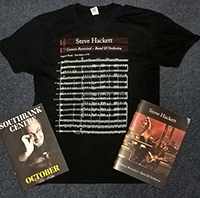 This is how it was for me. Was it perhaps the most wonderful concert of Genesis music I have ever attended? Am I just an extremely emotional dreamer pouring forth very unobjective descriptions? I pity every Genesis fan who could not attend any of those eight shows. Well, this show was recorded. Steve intends to release it. Buy the DVD and agree with me or don’t.
This is how it was for me. Was it perhaps the most wonderful concert of Genesis music I have ever attended? Am I just an extremely emotional dreamer pouring forth very unobjective descriptions? I pity every Genesis fan who could not attend any of those eight shows. Well, this show was recorded. Steve intends to release it. Buy the DVD and agree with me or don’t.
It is always difficult to balance an orchestra and a rock band. The latter instruments are in the foreground, theirs are the solos. Conductor and solo guitarist have established a wonderful harmony between the band and the orchestra (after a brief bumpy start) and taken it to unbelievable heights in the last pieces of both concert halves. Everybody enjoyed it, particularly Steve Hackett who was absolutely over the moon.
Anything to moan about? No, except for this desire for more, for songs like The Fountain Of Salmacis, Entangled, or Icarus Ascending. Says Steve in an interview: “This is probably the one and only time I’ll ever tour with an orchestra – unless it goes so well! All these years down the line and suddenly you’ve got the chance to do 8 dates up and down the country, with 2 dates in London, with an orchestra plus a group. It’s once-in-a-lifetime opportunity.“ [*12]. Yes, you must be happy like that.
6. Reprise
We went to the Tate Gallery the next day. I wanted to see the light in William Turner’s paintings and pay a visit to the Pre-Raphaelites. A small Turner painting draw my attention. It was called The Angel Standing In The Sun. [*13]. Fate?
References:
[*1]: http://www.iona.uk.com/albums/detail/id/7/woven-cord
[*2]: https://www.barock-konzerte.de/pages/10_0_0_42.html
[*3]: https://www.genesis-fanclub.de/c-Steve-Hackett-Island-2015-mit-Todmobile-Konzertberichte-s680.html
[*4]: https://de-de.facebook.com/bradleythachukconductor/
[*5]: https://progressivemusicreview.wordpress.com/2017/03/05/steve-hackett-live-at-kleinhans-music-hall-buffalo-with-philharmonic-orchestra-3rd-march-2017/
[*6]: https://de.wikipedia.org/wiki/Royal_Festival_Hall
[*7]: https://de.wikipedia.org/wiki/Orchester
[*8]: https://www.setlist.fm/setlist/steve-hackett/2017/kleinhans-music-hall-buffalo-ny-53f98365.html
[*9]: aus: Bettine von Arnim, Goethes Briefwechsel mit einem Kinde, Aufbau Verlag Berlin und
Weimar 1986, S. 120
[*10]: https://de.wikipedia.org/wiki/Bettina_von_Arnim
[*11]: aus: Bettine von Arnim, Die Günderode, Aufbau Verlag Berlin &Weimar 1989, S.107
[*12]: http://theprogressiveaspect.net/blog/2018/09/15/genesis-revisited-steve-hackett-looks-forward-to-his-orchestra-tour/
[*13]: https://en.wahooart.com/@@/6E3TM5-William-Turner-The-Angel,-Standing-in-the-Sun
To my wife with all my love, by Thomas Jesse
English by Martin Klinkhardt
